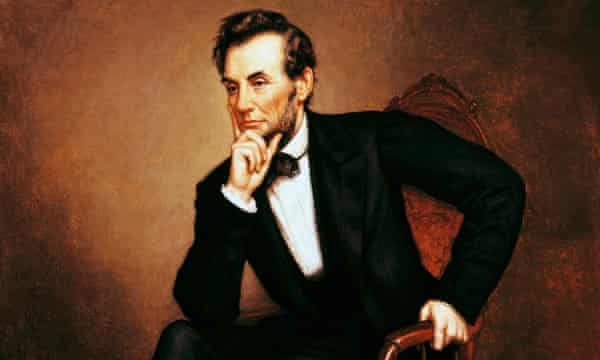Said It Once and I ll Said It Again
S omething alarming happened to Barack Obama on Thursday 5 June 2008. He was on the campaign trail addressing a town hall meeting in Bristol, Virginia, when in the midst of his customary rhetorical flow, he lost momentum and footing to an inarticulate halt.
"Everybody knows that it makes no sense … that you send a kid to the emergency room for a treatable illness like asthma, they terminate up taking up a hospital bed, it costs … when … if you lot … they just gave … you gave upward a hospital bed, information technology costs … when … if you lot … they just gave… you lot gave 'em treatment early and they got … some treatment … and … er … a breathalyser … or an inhalator … non a breathalyser … [audience laughter] … I haven't had much sleep in the concluding 48 hours or so."
The reason for his unexpected collapse wasn't biological; information technology was technical – his teleprompter had let him down.
The incident had his critics foaming at the oral fissure. In their view, it proved beyond doubt that Obama was a sham considering without a script and teleprompter to support his eloquence, he was equally wooden as Pinocchio.
Their reaction is non surprising, but is information technology justified? Spontaneity is regarded every bit one of the hallmarks of a great public speaker; just if yous scratch below the surface yous often detect that, in the words of Oscar Wilde, "spontaneity is a meticulously prepared fine art".
Ane of the most effective rhetorical devices for creating the illusion of spontaneity in a prepared speech is called metanoia (likewise known as correctio and epanorthosis) – from the Greek meaning to change one's mind. Two months after Obama's autocue mishap, his vice-presidential running mate Joe Biden raised a laugh when he used metanoia in his oral communication to the Democratic convention:
"You know, folks, that's the America that George Bush has left u.s.. And that's the America we'll continue to get if George – alibi me, if John McCain is elected president of the United States of America. Freudian slip. Freudian skid."

Biden's "Freudian slip" was about equally off-the-cuff as a corporal'south salute, and his quickly retracted slur – that presidential hopeful McCain was a George W Bush clone – was but a repetition of 1 of the themes of the 2008 Democratic election entrada. Just once a thing is said, even if it is taken back immediately, it tin't be unsaid: the impression it makes on an audience remains, undiminished. By correcting himself in mid-menses, Biden created the impression that he was thinking on his feet – quite an accomplishment for a pol whose own teleprompter gaffs have been well documented.
In his infamous Richmond lecture in Cambridge in 1962, the distinguished literary critic FR Leavis launched an intemperate and cruel personal attack on beau Cambridge bookish and scientist CP Snow:
"Snow is, of class, a – no, I can't say that; he isn't; Snow thinks of himself as a novelist … "
By drawing attending to the missing word, "novelist", Leavis's metanoia intensified his attack on Snow. And by inviting his audience to fill in the gap, he made them feel to some extent complicit in his unfolding diatribe. No i was left in any dubiousness that, as far as Leavis was concerned, Snow'southward literary output was beneath antipathy:
"Equally a novelist he doesn't exist; he doesn't begin to exist. He can't exist said to know what a novel is."
The controversy sparked by the viciousness of Leavis's assault reverberates to this day.
In his 2010 Tory conference spoken communication, David Cameron used metanoia to heap misery on to an already bowed and bloodied Labour opposition:
"Permit's starting time by beingness honest with ourselves. The mess this country is in – it'southward not all because of Labour. Of class, they must accept some of the blame. All right – they need to take a lot of the arraign. Let me just get this off my breast … "
A disruption in a formal spoken language is unexpected; it keeps an audience on its toes because it mirrors the spontaneity of everyday conversation, enabling the speaker to come up out with something, suspension, and and then revise it to make it stronger, milder or clearer.

Finding fault with a speaker because of their dependence on notes, script and teleprompter betrays an ignorance of the mechanics of swell oratory. The Gettysburg address is a mere 272 words long and takes less than three minutes to evangelize, and even so there are five known copies of information technology in Lincoln's ain paw, i of which is the copy he read from on 19 November 1863.
Winston Churchill dried up while giving a speech to the House of Commons in 1904. The experience shook him upwards so badly that from that day forward, he never gave a voice communication without using detailed notes.
Speaking on the record demands careful consideration; every word matters, so it's not a skillful time to busk. The appearance of spontaneity, though welcome, is an illusion that obscures its opposites: calculation, deliberation, and blueprint.
@MartinShovel
http://www.creativityworks.net
Source: https://www.theguardian.com/media/mind-your-language/2015/apr/28/im-sorry-ill-say-that-again-the-rhetorical-trick-of-metanoia
0 Response to "Said It Once and I ll Said It Again"
Post a Comment